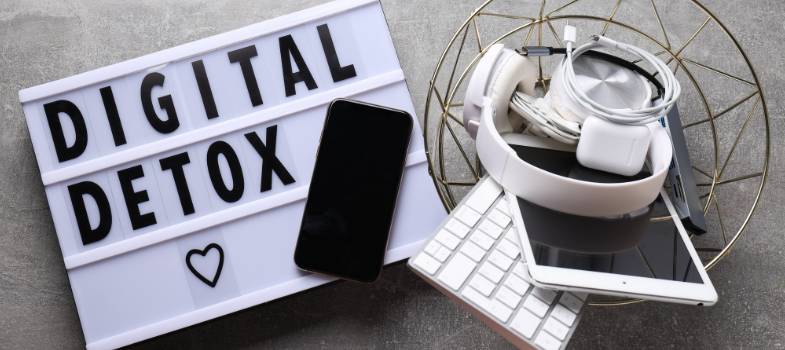We are in a world where our phones are almost attached to our hands, we are never far from or don’t know where it is. Scrolling has become a reflex, a numbing distraction, something we do automatically. I often see how this constant digital stimulation can become a way to avoid difficult emotions. It offers temporary relief, but over time, it can disconnect us from our bodies, our relationships, and even our healing process. A digital detox, therefore, may be an essential part of our self care therapy.
Women are more vulnerable to the struggle. Between careers, caregiving, relationships, and managing the emotional labor of life, digital devices often add another layer of pressure rather than relief. Social media, in particular, has become a double-edged sword—offering both inspiration one moment and fueling comparison, anxiety, and burnout the next.
Enter The Digital Detox
This is a powerful self care therapy tool for women’s mental, emotional, and physical health.
I’ve heard the term thrown around quite a bit – Digital Detox. What is it? And what does it mean? It may feel impossible to even imagine. I have kids, a partner, work, and family. I need to be in touch with all the logistics of my life, let alone my phone enables me to order groceries, plan transportation needs, and schedule daycare. It enables me to connect with friends, relax,and zone out. Why do I need to detox from all of that?
Anxiety, burnout and digital fatigue are something we are facing in our culture more than ever. Within our highly connected dopamine-driven world, we see that stepping away from screens isn’t just a luxury—it’s a mental health necessity.
We’re more connected than ever before, but not always in ways that serve us. Notifications, news alerts, emails, and the endless scroll of social media can overload our brains and leave us feeling overwhelmed, distracted, and disconnected even when we are using these incredible devices to maintain life’s organization or entertainment. It simply depletes our natural brain chemistry rhythms.
Our brains have not evolved to filter out the constant influx of stimuli, and it’s maxing out our capacity for attention. Instead of being empowered to choose what we focus on and to be intentional and selective in what we are paying attention to, our brain’s alert systems are vulnerable to being snatched up by likes, personally relevant information, emotionally charged, and flashy content.
This means that instead of being alerted once in a while when something is really important and SHOULD distract us, our brains are on constant hypervigilance and constantly scanning our virtual environment for anything bright and shiny.
This leaves us feeling exhausted, fatigued and unable to be present or to focus on things that truly matter. For more information about the incredible processes of the brain and our attention capacity, see research and talks by Dr. Amishi Jha (https://amishi.com/) , (Swing et al., 2010)
We now know that excessive screen time not only is associated with a mind that’s spread too thin and too exhausted but also with increased anxiety and depression (Twenge et al., 2018), sleep disturbances (Carter et al., 2016) and reduced empathy and face-to-face social skills (Uhls et al., 2014).
Not to mention the incredible “time blindness” that our phones can give us, the vortex of “taking just a sec to unplug” leading to hours of lost time and feeling guilty and shameful for it.
Our current research is leading to deeper understandings of this experience for all of us and many of us are starting to actually feel this reality. It’s becoming embodied in our daily experience. In the work I do in therapy sessions, these conversations come up frequently with people often saying, “I know, I really shouldn’t be on my phone so much, “ or “I really should put my phone down and focus on something else, but I feel so checked out”.
What To Do: An Emotion Self-Care Plan For the Digital Age
I normally avoid using the “should” word. This is an instance where I want to challenge you to take some accountability in matching your behavior to your intentions. Challenge yourself to follow through with a digital detox. Take that conscious break from digital devices—especially the ones that eat up our mental bandwidth, like smartphones, social media, and streaming platforms. It doesn’t mean you have to go full-on into the wild and book nature retreats (though if that sounds amazing, do that too!! We do offer retreats and outdoor therapy as an option). A detox can be as simple or structured as you need it to be. Make it small, manageable and think TINY steps. The same way you learn anything new.
How to Start a Simple Digital Detox
If the idea of going screen-free gives you more stress than relief, don’t worry—you can ease into it. Here are some beginner-friendly ways to unplug:
1. Tech-Free Mornings or Evenings
Start or end your day without your phone. Swap scrolling for self-care activities such as journaling, stretching, or just a quiet cup of coffee. This can be 3 minutes when first waking without your phone, or 20, it doesn’t matter as long as you give it a try. See how it feels. Notice how often you may feel the impulse to reach for the phone. See what happens when you start to resist the urge. You may start to feel that little bit of empowerment creep in 🙂
2. Curate Your Feed
Setting boundaries is crucial. Unfollow accounts that spark comparison or self-doubt. Follow only what nourishes you, empowers you, or brings peace. Baby duck reels anyone? Inspirational quotes or messages? Photos of nature, soundscapes?
3. Create a “Rest Mode” Ritual
Even one hour a day without screens can improve focus and emotional regulation. Try breathwork, physical activity such as a short walk, stretching, a warm bath, or journaling.
4. Take a Digital Sabbath for the Soul
Once a week, commit to several hours (or a whole day) unplugged. Spend that time with your body, your breath, nature, or people who uplift you. Make this plan ahead of time, do what you can to make arrangements that require your phone before or after this period of time. Order groceries the day before, let your parent know you will call them the next day, whatever helps you set that time aside and count on it!
5. Protect Your Energy
Turn off notifications for apps that don’t require immediate response. Give yourself permission not to be accessible all the time.
The most important thing to accompany a digital detox? Add in a little mindfulness therapy. Instead of picking up your phone, take three slow deep breaths and notice how your breath feels moving in and out of your lungs. Before you check that post you made? Close your eyes and feel your feet on whatever surface you are standing or sitting on, wiggle your toes and see if you can feel your little toe moving. It can be that easy, and it can be INCREDIBLY powerful.
Benefits of Unplugging
Dr. Amishi’s research found that if you practice just 12 minutes of mindfulness a day, you will feel much more empowered to engage in your life the way YOU want, not the way you find yourself doing on autopilot.
You will experience:
- Improved focus and mental clarity
- Better sleep and reduced screen-induced insomnia
- Deeper connections with others
- Less anxiety and fewer distractions
- A renewed sense of creativity and presence
- Support nervous system health, which is crucial for hormone balance and stress recovery
- Space for intuitive awareness—that quiet voice within that gets drowned out by digital noise
- When you unplug, you begin to reclaim ownership over your attention, energy, and wellness.
Think of it as giving your nervous system a breather. And most importantly, think of this as a gift to yourself!
Finding Balance
A digital detox isn’t about demonizing technology. After all, I provide online therapy, so I know the digital world offers some benefits. With a digital detox, it’s about using tech intentionally instead of letting it use you. Phones, computers, and social media can be incredible tools for connection and creativity—but only when we’re in control.
Unplugging even for a few hours can be an act of radical self-care. It invites us back into the moment, back into our bodies, and back into our lives. So next time you feel frazzled or overstimulated, try hitting pause on the digital noise.
You just might find that less screen time equals more you time.
As women, we’re often conditioned to “do it all” and technology makes that seem possible. But constant digital stimulation perpetuates the myth of multitasking and just leads to brain fatigue and burnout. This can chip away at our mental health, nervous system, and sense of self. A digital detox is not just a tech break—it’s a reclamation of peace, power, and presence.
Whether you’re a mom, a professional, a student, or a woman just trying to find balance in a chaotic world, remember this:
You don’t need to be online to be enough.
Start Your Wellness Journey
While a digital detox can be an excellent self care therapy options, sometimes we need more help. If you are struggling, our counseling services can help you reclaim your spirit and provide you with much-need emotional support.
Whether you need to find a therapist for anxiety, a therapist for depression or for other mental health issues, we offer comprehensive therapy for women. We utilize a holistic therapy approach that often includes getting out into nature. In addition to talk therapy and wellness therapy, we offer wellness retreats that provide a safe space for women to explore their emotions and connect with each other and with their natural surroundings.
If you’ve been searching for Bozeman therapists, Kalispell therapists or perhaps therapists in Missoula, we serve clients throughout Montana, as well as Wyoming and Colorado. We know accessing care in these rugged, sparsely populated areas can be tough, which is why we offer online counseling services as well as in-person psychotherapy. Contact us at any time for a free consultation and let’s get you on a path toward healing.



